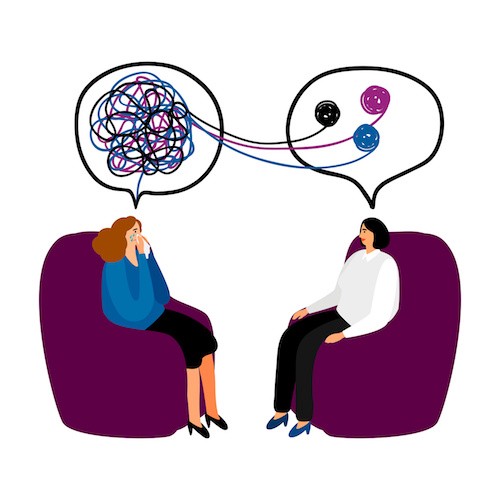If you’re looking for a comprehensive guide to interpersonal therapy, you’ve come to the right place. In this blog post, we will discuss what interpersonal therapy is, its benefits, and how you can get started with it. Interpersonal therapy is a type of psychotherapy that focuses on the relationships between people. It has been shown to be an effective treatment for a variety of mental health disorders, including depression and anxiety.
Contents
Defining Interpersonal Therapy
The first step in understanding interpersonal therapy is to define it. Interpersonal therapy is a type of psychotherapy that focuses on the relationships between people. It is based on the belief that our relationships with others are key to our mental health and well-being. It works by helping us to understand and change the patterns of our relationships that may be contributing to our mental health problems.
Interpersonal therapy is usually short-term, lasting for 12-16 weeks. It is typically conducted in individual sessions, although group therapy or family therapy may also be used. The number of sessions and the length of each session will vary depending on the needs of the individual.
Types
There are two main types of interpersonal therapy.
Metacognitive interpersonal therapy (MIT) is a newer type of therapy that focuses on the way we think about our relationships. It helps us to become aware of and change the negative thoughts and beliefs that may be contributing to our mental health problems.
Dynamic interpersonal therapy (DIT) is a more traditional type of therapy that focuses on the patterns of our relationships. It helps us to understand how our past experiences with others have shaped our current relationships. It also helps us to change the patterns of behavior that may be contributing to our mental health problems.
Ultimately, the end goal of both these types is to help us improve our relationships and our mental health.
What Are The Steps Involved In IPT Therapy?

The process of interpersonal therapy involves four main steps.
- The first step is to assess the problem. This usually involves meeting with the therapist for an initial assessment. During this time, the therapist will ask questions about your symptoms, your relationships, and your past experiences. They will also want to know about any medications you are taking and any other treatments you have tried in the past.
- The second step is to identify the patterns of behavior that are contributing to the problem. This may involve exploring your childhood experiences, looking at how you relate to others, and identifying any negative thought patterns or beliefs that may be affecting your mental health.
- The third step is to help you change these patterns of behavior. This usually involves learning new skills and techniques for interacting with others. It may also involve changing the way you think about yourself and your relationships.
- The fourth and final step is to help you maintain these changes. This usually involves meeting with the therapist on a regular basis to review your progress and ensure that you are further continuing to use the skills and techniques you have learned.
This process can be daunting, but the therapist will help you to take it one step at a time. They will provide support and guidance throughout the process.
What Are The Techniques Used?
Some of the techniques that are used in interpersonal therapy include:
- exploring your thoughts and feelings about yourself and your relationships
- learning how to communicate effectively with others
- learning how to set boundaries in your relationships
- exploring your childhood experiences and how they have affected your current relationships
- learning how to handle conflict in your relationships
- learning new skills for interacting with others
- practicing these skills in therapy sessions
- discussing your progress with the therapist on a regular basis.
Ultimately, the goal is to help you understand yourself and your relationships better. This self-awareness can then be used to make positive changes in your life.
Which Conditions Does IPT Help?

Interpersonal therapy has been found to be effective in treating a number of mental health conditions, including:
- Depression and types such as seasonal affective disorder (SAD), postpartum depression, and dysthymia
- Anxiety disorders such as social anxiety disorder, panic disorder, and generalized anxiety disorder
- Eating disorders such as anorexia nervosa, bulimia nervosa, and binge eating disorder
- Personality disorders such as borderline personality disorder, narcissistic personality disorder, and avoidant personality disorder.
- Bipolar disorder
- Substance abuse disorders
- Post-traumatic stress disorder (PTSD)
In addition to treating mental disorders, IPT also helps us improve areas of life that are beneficial for our overall mental and emotional well-being as well. These include:
- improved mental health symptoms
- improved relationships with family and friends
- better communication skills
- greater self-awareness
- increased ability to manage conflict
- reduced feelings of isolation and loneliness
In addition, interpersonal therapy has been found to be helpful in preventing relapse. This means that it can help you to stay well after you have completed treatment.
What Are Its Limitations?
Like all therapies, interpersonal therapy has some limitations. These include:
- The length of therapy may be too short for some people. This is because the therapist will want to see if there is improvement after a few sessions. If there is no improvement, they may recommend that you try another therapy.
- It may not be suitable for people who are in a very bad place mentally or emotionally. This is because the therapist will need you to be able to talk about your thoughts and feelings.
- Some people find it difficult to open up about their personal lives. If this is the case, you may find it hard to get anything out of therapy.
- It may not be suitable for people who have been through traumatic experiences. This is because IPT can involve talking about these experiences, which can be difficult for some people.
- It may not be suitable for people who have very serious mental health conditions such as schizophrenia or psychosis. This is because the therapist will need you to be able to talk about your thoughts and feelings.
If you have any of these limitations, there are other types of therapy that may also be more suitable for you.
How To Find IPT Therapists?

If you are interested in finding an interpersonal therapist, there are a few ways to do this.
- Internet surfing
- Recommendations from friends and family
- Approaching health centers/clinics/hospitals
- Contacting the psychology departments of universities
After collecting a database of potential therapists, you can reach out to them and schedule an introductory meeting. In order to ensure that the therapist is a good fit for you, it is important to ask them relevant questions about their practice. Some sample questions you may ask them to include:
- What are your educational credentials?
- What is your training and experience in interpersonal therapy?
- How many patients have you treated with this type of therapy?
- Do you have any training/certification in interpersonal therapy?
- What are the success rates of your patients?
- How would you approach treatment for my condition?
- What are your charges per session?
- What are the main methods that you use in therapy?
- Do you think that I would be a good candidate for interpersonal therapy?
- Are there any other treatments that you recommend in addition to therapy?
- What is your policy on confidentiality?
It is also important to feel comfortable with the therapist. This means that you should feel like you can trust them and that they understand you. If you don’t feel this way, it may be best to look for another therapist. If the therapist is not a good fit for you, do not hesitate to look for someone else.
What Happens In IPT Therapy?
The first few sessions of therapy will usually involve the therapist getting to know you and your situation. They will ask about your symptoms, thoughts, feelings, and experiences. They will also ask about your relationships with family, friends, and others.
Once the therapist has a good understanding of your situation, they will work with you to set some goals for therapy. These goals may be around improving your mental health symptoms, communication skills, or relationships. Therapy usually lasts for around 12-20 weeks, although this may vary depending on your individual needs.
When therapy comes to an end, the therapist will usually review your progress and discuss any goals that you have not yet achieved. They may also give you some homework to do, such as practicing the skills you have learned in therapy or reading about certain topics. The therapist may also refer you to other services or support groups. Otherwise, they will provide you with information about how to access mental health services if your symptoms worsen in the future.
Things To Consider
Before starting therapy, it is important to consider some points. These may be:
- Cost of therapy: while some health insurance plans cover the cost of therapy, others do not. It is important to check with your insurance provider to see if they cover the cost of interpersonal therapy.
- Time commitment: therapy usually requires a time commitment of around 12-20 weeks.
- The location: therapy usually takes place in an office, although some therapists offer online or telephone sessions.
- Confidentiality: it is important to discuss confidentiality with your therapist before starting therapy. This means understanding what information they will and will not share with others.
- Whether you feel comfortable with the therapist: it is important to feel comfortable with your therapist. This means that you should feel like you can trust them and that they understand you.
- Your goals for therapy: it is important to have realistic expectations for therapy. This means understanding that therapy may not cure your condition, but it can help you to manage your symptoms and improve your quality of life.
- Willingness to open up: therapy requires you to share personal thoughts and feelings. This can be difficult for some people, but it is necessary for therapy to be effective. Ensuring honesty and transparency with your therapist will help to create a more trusting relationship.
- Putting in effort: therapy requires you to put in effort outside of sessions. This may include practicing the skills you have learned in therapy or reading about certain topics. Therapy can be an effective treatment for mental health conditions, but it requires additional time, effort, and commitment.
If you are considering interpersonal therapy, then the above points are worth considering. However, ultimately the decision to start therapy is up to you. If you think that interpersonal therapy could be helpful for you, then reach out to a therapist today.
Conclusion
Interpersonal therapy is a type of therapy that can be used to treat mental disorders and improve areas of life that are beneficial for our overall mental and emotional well-being. It has been found to be helpful in preventing relapse and is suitable for people who are able to talk about their thoughts and feelings. Ultimately, interpersonal therapy can be an effective way to improve your mental health and wellbeing. So if you think it could be helpful for you, don’t hesitate to reach out to a therapist today.
If you are searching for trustworthy, affordable, and effective IPT therapists, contact Mantra Care! We have a team of expert mental health professionals from all across the world offering a variety of mental health treatments. You can reach out to us to book a session or download our free Android or iOS app.


